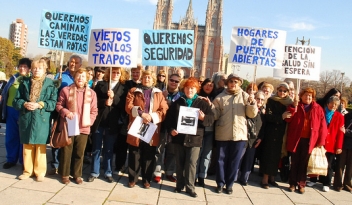 Around 75% of the 35 million people who die from non-communicable diseases (NCDs) worldwide are people aged 60 and over, the majority of whom live in low- and middle-income countries.
Around 75% of the 35 million people who die from non-communicable diseases (NCDs) worldwide are people aged 60 and over, the majority of whom live in low- and middle-income countries.
The rapid increase predicted in the number of older people in the low and middle-income countries from 473 million in 2009 to 1.6 billion in 2050 makes addressing older people’s needs regarding NCDs an urgent priority.
Today I am at the UN High Level Meeting on non-communicable diseases, held in New York – a critical moment for rallying global efforts to meet the needs of all age groups affected by NCDs.
The proposals on the table have the potential to help shift the behaviour of millions of people to healthier lifestyles and provide much needed healthcare, treatment and support.
The interest generated by this issue is evident from the attendance of Heads of State from a number of countries, as well as lobbying groups, including more than 600 NGOs.
Non-communicable diseases not just illnesses ‘of affluence’
During the Summit debate many countries, both from the developed and developing world, have pointed out that addressing NCDs is a development issue, since poor health and poverty are closely linked.
The Zimbabwean Minister of Health noted that NCDs trap households in a “vicious cycle” of poverty.
There was general agreement that NCDs could no longer be considered “diseases of affluence”; indeed in many countries it is the poor who are especially at risk, due to poor diet, risks behaviours such as smoking, and exposure to degraded environments.
The World Bank representative, while calling for a strong country-level response, emphasised that such responses required global support. However the Summit did not reach agreement on additional funding or other resources to combat NCDs.
The outcomes document from the Summit (the Political Statement) was adopted unanimously by Member States.
Due to intensive lobbying efforts by civil society in recent months, the Political Statement now has some important new dimensions.
Ageing is now recognised as a key driver of NCDs, with active steps called for to address people’s health needs across the life-course.
Health planning focuses on preventable morbidity and death without setting arbitrary age limits for “premature death”.
Mental and neurological diseases, including Alzheimer’s disease and other dementias, are now recognised as an important cause of morbidity contributing to the global NCD burden.
It is recognised that NCD prevention programmes and health care interventions should provide equitable access to effective programmes for these illnesses. The need to scale up palliative care and support provision is also acknowledged, alongside preventive and curative measures for NCDs.
No resources or targets to tackle NCDs
However as noted above, the Summit has not achieved agreement on new resources for combating NCDs. Also there are as yet no specific targets or indicators relevant to any age group, including older people.
However, WHO has been requested to design progress indicators, though the discussion has focused strongly on prevention targets, and treatment and care for those already suffering chronic illness has been neglected. This has potentially serious consequences for older people, both as givers and receivers of care.
The progress made so far to address these issues as reflected in the draft Political Statement coming out of the two-day UN summit is welcome.
However, unless Member States follow up their agreement with policy and practice which reach older as well as younger age groups, there will be little cause for celebration when these commitments are reviewed in the coming years.
What you can do
- Do you think older people in your country face discrimination in getting treatment for cancer, diabetes, cardiovascular disease, hypertension and dementia? We’d love to hear from you – leave us a comment below or post on our Facebook page.
- Keep up to date on how our campaign is going by signing up for our eNewsletter.
- Read this edition of Ageing and Development (1.1mb) which includes more stories on older people and non communicable diseases.
